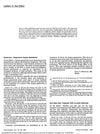Risk-Benefit Ratio in the Treatment of Psoriasis with Systemic Retinoids
June 1990
in “
British Journal of Dermatology
”
systemic retinoids etretinate acitretin mucocutaneous effects photosensitivity hair changes nail changes skeletal toxicity liver function abnormalities serum lipid alterations teratogenicity PASI scores PUVA therapy retinoids skin sensitivity hair loss nail issues bone toxicity liver issues lipid changes birth defects psoriasis severity index psoralen and ultraviolet A therapy

TLDR Systemic retinoids are effective for psoriasis but have side effects; benefits may outweigh risks, especially when reducing cancer risks from other treatments.
The document from 1990 reviewed the use of systemic retinoids, etretinate and acitretin, for treating psoriasis, highlighting their effectiveness in improving symptoms, with about 30% of patients achieving total clearance after 3 months at doses of 0.6–1 mg/kg/day, and a 60-70% reduction in PASI scores. However, it also detailed a range of side effects, including mucocutaneous effects, photosensitivity, hair changes, nail changes, and skeletal toxicity, with the latter being dose and duration-dependent. Liver function abnormalities and serum lipid alterations were reversible upon dose reduction or cessation of therapy. Teratogenicity was a serious concern, necessitating careful consideration of the risk:benefit ratio. Despite the side effects, etretinate was considered relatively safe, with severe morbidity being rare and most side effects reversible. The document concluded that while etretinate may not clear psoriasis in all patients, it can be an effective adjuvant therapy, particularly in reducing the carcinogenic risks associated with PUVA therapy, and that long-term evaluation is necessary to fully determine its role in psoriasis treatment.




